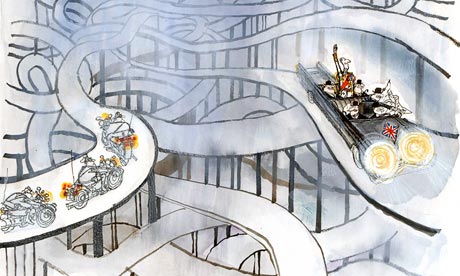
I was an asthmatic child and didn't get much of an art education. But then, at the age of about 14, I discovered Ronald Searle. He was working as a cartoonist for the News Chronicle and Punch magazine, doing wonderful, satirical portraits of people such as the Archbishop of Canterbury. He became my hero. I found out where he lived and used to cycle over to Bayswater from Hampstead, composing what I would say to the great man. His house had a green door with a brass doorbell – but I could never get my fingers to ring it. I was too afraid. I would get back on my bike and cycle home, feeling dismal.
A few years later, my wife Jane Asher organised a secret meal for my birthday at this exclusive restaurant in Provence. When we walked in, the only other people there were Ronald and his wife. It turned out they had lived in this town for years. A beautiful little package sat on the table, all done up with ribbon. I said: "Oh, is this for me?" And Ronald said: "Yeah, it's nothing." So I opened it, and there was a brass doorbell with a note saying: "Please ring any time."
We became great friends, meeting up in that restaurant every year. Ronald had a wonderfully dry sense of humour. Once a year, he would pay the restaurant with a picture: pigs going into the kitchen looking doubtful, or snails crawling on to people's plates. We would always find pictures waiting for us at the table: Jane would have a drawing of a cat wearing a ballerina's outfit or putting lipstick on in front of a mirror; and I would have a bearded, scruffy cat, scratching his head, pens and paper laid out, waiting for his cartoon to come. Ronald made me laugh so much: although he was an elderly man, he didn't have an old mind at all.
I'll always remember his kindness: he was laudatory about my work, and would send me pages telling me what he liked about it. He used to love sitting and talking about art. After our meal in the restaurant, we would go back to his house for what he called "a little bit more engine oil" – meaning an expensive champagne that he loved. He and I would discuss all the art around. He was quite acerbic: if he didn't like something, he didn't pussyfoot. Even in his late 80s and early 90s, he was still worrying where the next job was coming from. He just wanted to keep working and drawing. Luckily he was able to – right to the end.
Ronald didn't just draw funny little men with big noses: he taught me that you have to take the caricature from the character. If you're drawing Margaret Thatcher, she must look cutting and acerbic, because she's that sort of woman; whereas if you were drawing John Major, you couldn't possibly make him that way. Ronald showed me that you have to really look at a person and assimilate what they are, then let that flow out on to the paper. He was one of those artists who could really draw properly. Many just think the idea's the thing – that you can get the idea and then just do a little scribble. He'd spent his early years in a Japanese prisoner of war camp: it's extraordinary to think that this thin, wiry little man survived that and came back to make us all laugh.
People think of Ronald's style as very British, but he didn't see himself that way. He was very popular in Europe: over the last decade, he drew political cartoons for Le Monde, and a museum in Hanover recently bought most of his work. I'm glad somebody did – but it's a bit of a disgrace that it wasn't a British gallery.
He didn't like talking about St Trinian's. He created the strip early in his career, back in the 1950s, and it became a huge monster he couldn't control – especially the new films. He did tell me that he was paid something pitiful for the first St Trinian's movies featuring Alastair Sim and all those old stars.
Although he was always popular, I'm not sure Ronald felt appreciated as an artist in this country. There's a strict delineation between cartoonist and fine artist over here that doesn't exist in Germany and France. Cartoonists are often regarded as people who just dash things off on envelopes for a quick joke. My sadness is that he was never knighted, although I don't suppose Ronald cared a stuff.
Interview by Laura Barnett.

